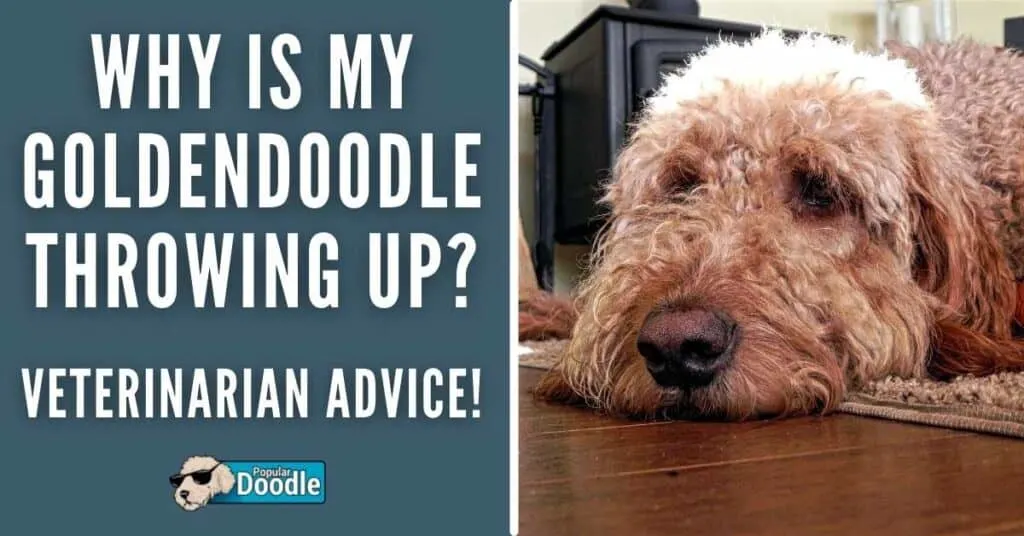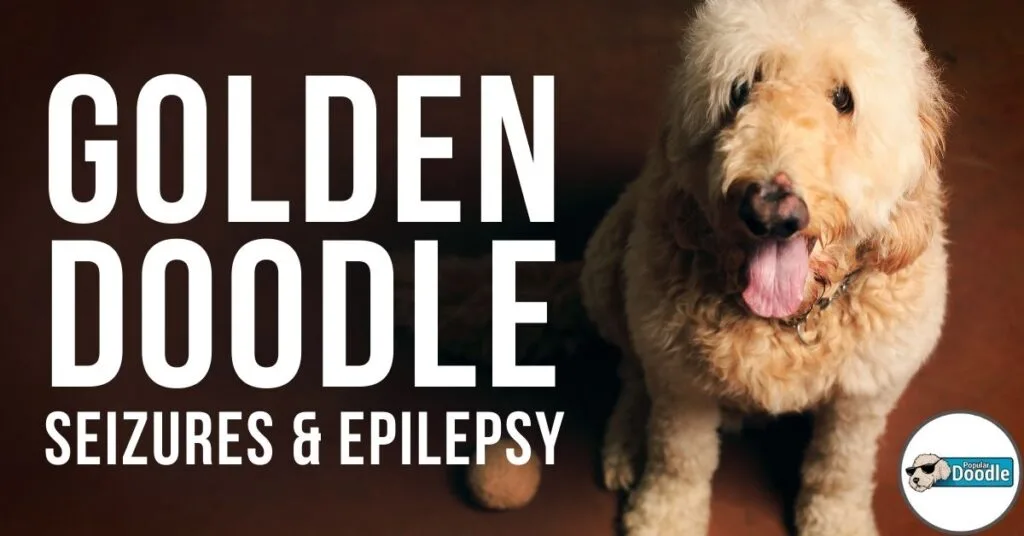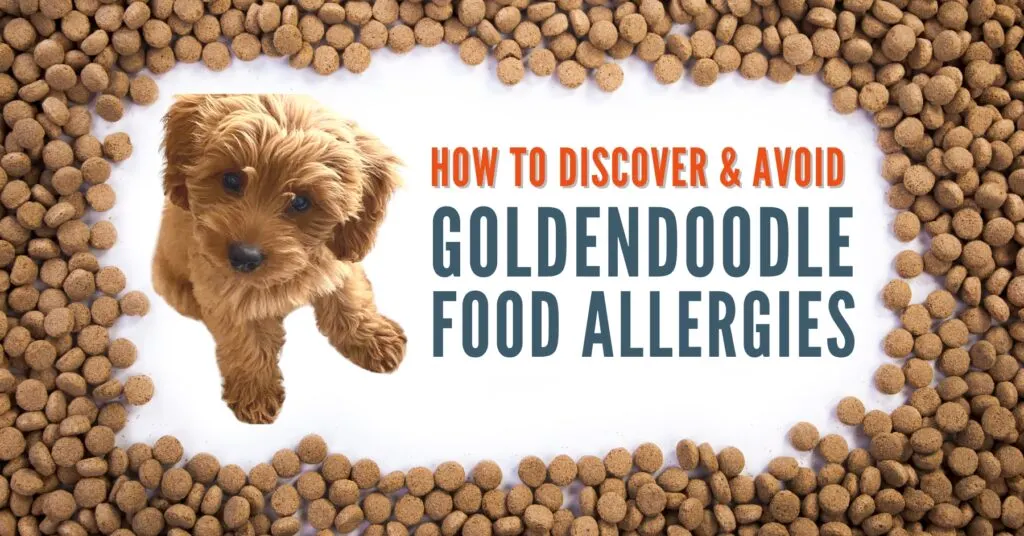By Dr. Merliza Cabriles, D.V.M.

Your Goldendoodle throwing up can be caused by a variety of issues that range from simple dietary indiscretion, to diseases of the stomach, to conditions that cause the build-up of toxic substances in the blood. Indeed, the list is definitely long!
Goldendoodle vomiting is not a disease, but rather an important symptom of an underlying health issue. It should not be confused with regurgitation.
In vomiting, the dog makes an effort to forcefully bring the contents (food/liquid) of the stomach or the upper intestine up and out of the mouth.
On the other hand, regurgitation does not take any effort, meaning it’s a passive process. It usually takes place soon after a meal or after drinking.
Unlike vomiting, stomach contents are expelled without any active abdominal contractions involved. Also, regurgitated food is usually undigested and does not contain bile.
With vomiting, the expelled food has already undergone partial digestion and contains some bile.
Is It Normal For Goldendoodles To Puke Frequently?
It’s not normal for Goldendoodles, or any other breed of dog, to throw up frequently.
It’s not uncommon for Goldendoodles to puke every once in a while. Most of these cases usually resolve on their own without any medical intervention.
However, there are instances when vomiting could be a sign of something more serious that needs prompt veterinary attention. Keeping a close eye on your pet is very important so you will know if there is a need to seek immediate medical attention.
Not sure what to do? Click here to live chat instantly with a verified veterinarian!
Why Is My Goldendoodle Throwing Up? The Most Common Causes of Goldendoodle Vomiting
Goldendoodle vomiting may be acute or chronic in nature. Acute vomiting occurs when a dog experiences a sudden bout of vomiting. On the other hand, chronic vomiting in dogs refers to frequent or long-term episodes of vomiting.
Below are most common causes of vomiting in Goldendoodles. Keep in mind that many of these are expensive conditions to treat, so it’s highly recommended that all Goldendoodle owners invest in pet insurance as early in your dog’s life as possible. This can save you up to 90% on your veterinary bills!
Two companies to look into that many doodle owners swear by are Healthy Paws and Embrace.
Dietary indiscretion
This refers to eating spoiled or raw food, non-food items such as cat litter, garbage, foreign objects, plants, or overfeeding. Adverse reactions to any of these items can cause vomiting in dogs.
Toxins or Poisons
Vomiting is a prominent symptom when a dog ingests something toxic or poisonous. The most common cases of poisoning in Goldendoodles have been linked to consumption of:
- Medications for Humans – This include over-the-counter (OTC) and prescription medications. The most common ones include non-steroidal anti-inflammatory drugs (NSAIDs) such as naproxen or ibuprofen, antidepressants, blood pressure medications, as well as herbal and nutraceutical products.
- Veterinary Products – Adverse reactions may occur if there is accidental ingestion or when used in excessive amounts. Common products include flea and tick medications, painkillers, and dewormers.
- Human Food – Common examples include chocolate, alcohol, avocado, macadamia nuts, xylitol, grapes, and raisins.
- Rodenticides – A dog may accidentally consume rat and mouse poison or eat a rodent that has been exposed to these toxins.
- Plants – Tulips, azaleas, sago palms, oleander, amaryllis, and daffodils are just some of the plants that cause severe cases of vomiting in dogs.
- Pet Medications – Vomiting may be an adverse reaction to over-dosage of painkillers, dewormers, and other medications.
- Household Cleaning Products – These may contain ingredients that can cause stomach and respiratory problems. In fact, it’s a leading cause of poisoning in pets.
- Chemicals – Antifreeze, chemicals used for swimming pools, oven cleaners, drain cleaners, or lime removal products are just some examples of hazardous chemicals that cause serious vomiting in dogs.
- Heavy Metals – Paint, batteries, and linoleum may contain lead that is toxic to dogs when ingested.
- Lawn and Garden Products – Fertilizer, mulch, snail bait, pesticides, herbicides, etc. may contain substances that cause toxicity in dogs.
Bloat
Also called gastric dilatation-volvulus (GDV), bloat is a very serious condition that could have fatal consequences if left untreated.
The problem occurs when gas, food, and/or liquid accumulates in the stomach causing it to twist.
The symptoms of bloat include restlessness, a swollen or distended abdomen that is painful, excessive drooling, rapid breathing, and collapse. Your Goldendoodle may retch or attempt to vomit without success.
Heat Stroke
Unlike humans, Goldendoodles have very few sweat glands which make them inefficient in eliminating heat from their bodies. Panting also helps them lose body heat.
But when panting and sweating aren’t enough, there is a subsequent increase in a dog’s body temperature, paving the way for heat stroke, a condition that can be potentially fatal without prompt veterinary attention.
Prominent symptoms of dog heat stroke include excessive panting, drooling, vomiting, diarrhea, red gums, incoordination, and collapse.
Read More: Why Do Goldendoodles Pant So Much? (Veterinarian Advice!)
Change in Diet
A sudden change in diet can cause digestive upsets manifested by vomiting, diarrhea, and abdominal discomfort.
When switching your Goldendoodle to a new type of food, it is highly recommended to do it gradually through a 7-10 day transition period. This is accomplished by gradually decreasing the amount of the old pet food while gradually increasing the quantity of the new type of pet food.
The transition period will allow enough time for the dog’s digestive system to get used to the new food.
Intestinal Parasites
The presence of intestinal parasites such as roundworms, tapeworms, and protozoan parasites should be suspected if your Goldendoodle exhibits the following symptoms:
- Distended belly
- Unexplained weight loss
- Diarrhea
- Vomiting
- Lethargy
- Dull coat
Related: Veterinarian Answers: How Long Does it Take for Worms to Leave a Dog?
Pancreatitis
Goldendoodles with an inflamed pancreas exhibit repeated vomiting, nausea, fever, abdominal pain and distension, lethargy, diarrhea, and loss of appetite. Pancreatitis is potentially life-threatening.
Liver Disease
Liver disease may be acute or chronic. Important causes of liver failure include cancer, diabetes, poisoning, viral or bacterial infection, obstruction of the bile duct caused by cysts or gallstones, endocrine problems (hyperthyroidism or Cushing’s disease), trauma to the liver, heatstroke, or poisoning.
Both the Golden Retriever and Poodle are more predisposed to health issues such as congenital liver disease. Affected dogs exhibit vomiting, diarrhea, increased thirst and urination, loss of appetite, and weight loss.
Kidney Failure
When a problem prevents the kidneys from filtering out toxins from the body, the buildup can cause kidney failure.
Important causes of kidney failure include common dog poisons like antifreeze, raisins, grapes, and certain medications such as NSAIDs.
Serious bacterial or viral infections can also cause sudden kidney failure. Dehydration, heatstroke, snake bites, or bee stings can lead to kidney failure.

Bacterial or Viral Infections
Goldendoodles that are sick with bacterial, viral, or fungal infections usually suffer from digestive upsets (vomiting and/or diarrhea), fever, lethargy, and loss of appetite.
Some common pathogens that infect dogs include Salmonella, Clostridia, E. coli, Parvovirus, and Rotavirus. Vomiting could also be present in Goldendoodles with ear infections.
Motion Sickness
Like humans, Goldendoodles can also suffer from motion sickness. The problem is more common among young dogs because the inner parts of their ears that are involved in maintaining their sense of balance are still developing.
Most puppies outgrow motion sickness by the time they’re one year old.
Motion or car sickness may also affect adult Goldendoodles that become anxious or nervous during travel because they lack conditioning and are overwhelmed by the unfamiliar stimuli they are bombarded with while riding in a moving vehicle.
Vomiting and/or diarrhea may occur as a result of stress and heightened anxiety.
Inflammation in the Intestines
Frequent vomiting is a prominent symptom of intestinal inflammation in Goldendoodles. The vomitus may contain froth, undigested food, fresh blood, and/or bile.
When the problem is in the lower part of the gastrointestinal tract (GIT), digested blood when present may appear like coffee grounds.
Intestinal Obstruction
When there is a partial or complete blockage anywhere in the intestine, it can affect the flow of fluid and food. Intestinal obstruction can be deadly if it’s not caught and given prompt treatment.
Signs of intestinal obstruction in dogs include vomiting, diarrhea, loss of appetite, straining during elimination, inability to defecate, excessive drooling, tarry stools, listlessness, and a bloated and painful abdomen.
Cancer
Vomiting is the most common symptom in dogs with stomach cancer. It’s often the first sign and may be tinged with blood or look like coffee grounds.
As cancer progresses, vomiting is usually accompanied by excessive salivation, decreased appetite, weight loss, lethargy, and abdominal pain.
Uterine Infection (Pyometra)
Hormonal changes in female Goldendoodles are an important predisposing factor in the development of pyometra. Dogs that are on progesterone-based drugs also have higher risks of pyometra.
Vomiting and/or diarrhea may be present especially in closed pyometra, a type of uterine infection associated with a closed cervix that prevents the drainage of pus from the uterus to the outside.
Affected dogs may appear severely ill and are depressed, very listless, and anorectic.

When Should You Be Concerned About Your Goldendoodle Vomiting?
When it comes to vomiting in Goldendoodles, it’s important for dog owners to be able to determine when it’s necessary to bring their pets to the vet and when it’s okay to manage the condition at home.
Some cases of vomiting resolve on their own without any treatment. Home management and treatment may be suitable for some cases.
If your Goldendoodle has been vomiting for less than 12 hours but remains active, it is a good idea to wait and closely monitor your pet. When in doubt, call your veterinarian to see if they recommend scheduling an appointment.
However, not all cases of Goldendoodle vomiting should be managed at home.
Immediate veterinary care should be sought when potential toxicity is suspected or your dog has vomited multiple times for more than 24 hours.
Vomiting that is accompanied by the following symptoms should also warrant prompt medical intervention:
- Diarrhea
- Decrease or loss of appetite
- Blood is present in vomit or stool
- Severe lethargy
- Increased thirst
- Dehydration
- Pale gums
- Abdominal pain
- Fever
- Collapse
You should also take your Goldendoodle to the veterinarian if your pet is very young, very old, or is suffering from other health issues. When in doubt, get in contact with your veterinarian.
Not sure what to do? Click here to live chat instantly with a verified veterinarian!
Goldendoodle Puppy Vomiting
While there is a possibility that vomiting in dogs can be potentially serious, puppy vomiting should always be viewed as a potential emergency.
Their immune systems are still developing and the protection from the maternal immunity that they have received during birth slowly wanes with time.
While they are still receiving vaccinations, puppies have very high risks of acquiring serious diseases like parvovirus. This is an important reason why you should call your veterinarian if your puppy is vomiting.
Considering that vomiting could be a symptom of many serious health issues, potential complications are a major concern. Minor cases of vomiting could balloon into serious issues that could be life-threatening.

Dr. Merliza Cabriles, D.V.M.
Contributing Professional
Dr. Merliza Cabriles is a licensed veterinarian and university professor with many years of experience in food animal and pet companion medicine. Her passion for writing as well as pet parent education and support is echoed in the articles and ebooks she has written.








